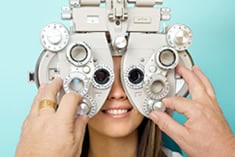Routine Eye Examinations
We provide comprehensive eye care to patients of all ages. Our services include not only laser vision correction and small-incision cataract surgery but also treatments for a range of conditions such as glaucoma, the diabetic eye, dry eye and macular degeneration.

Regular eye exams are an invaluable tool in maintaining your eyes’ health by detecting and preventing disease. Some diseases develop slowly without causing pain or vision loss. Early detection of any problems can reduce the risk of further harm and allow for a choice of treatment options.
Dry Eye Treatment
Dry eye can make a person’s eyes dry, red, or irritated. In addition to being uncomfortable, it can damage the eye’s tissues and impair vision.
People usually begin experiencing dry eye symptoms as they age, but the condition can also result from eyelid or blinking problems, certain medications, environment, injury, and various health problems. The eyes may become dry and irritated because the tear ducts don’t produce enough tears, or because the tears themselves have a chemical imbalance.
Macular Degeneration
The macula is a part of the retina in the back of the eye that ensures that our central vision is clear and sharp. Macular degeneration causes a progressive loss of vision. It is the number-one cause of blindness in the U.S.
There are two kinds of macular degeneration: “wet” and “dry.” The “wet” form can be treated in its early stages. Regular eye exams are highly recommended to detect macular degeneration early and prevent permanent vision loss.
Symptoms often associated with macular degeneration include:
- A gradual loss of ability to see objects clearly
- A gradual loss of color vision
- Distorted vision
- A dark or empty area appearing in the center of vision
Pterygium Surgery
A pterygium is a raised growth in the conjunctiva (the surface of the eye) made mostly of collagen and tiny red capillaries. Pterygiums are usually caused by extended exposure to sunlight. They may remain stable after appearing, or they may grow and affect vision. Treatments include eye drops for irritation and redness, protection from sunlight and dust to prevent the pterygium from worsening, and occasionally steroids to lessen inflammation. If the pterygium grows into the central cornea, surgical removal is recommended. This prevents the pterygium from altering the cornea’s shape and affecting vision.
Contact Lenses
Over 30 million Americans wear contact lenses, according to the American Optometric Association. There are many different kinds of “contacts,” including rigid and flexible, extended wear, disposable and planned replacement lenses, and some can be made as bifocals or in different colors.

After a thorough eye exam and consultation with an experienced physician, patients who qualify for contact lenses can discuss which type is right for them. All contact lenses require special care and cleaning and regular follow-up visits to ensure that the eyes remain healthy.

